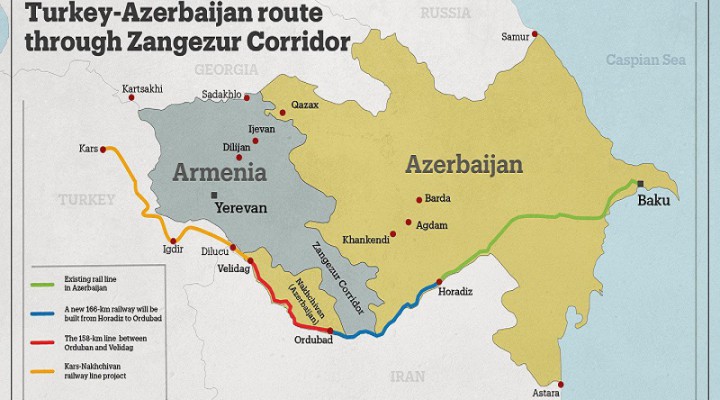The Zangezur Corridor Is The ECO’s Most Strategic Project

To oppose the Zangezur Corridor is to oppose China and Russia’s multipolar vision. It also suggests that one has fallen for self-interested forces’ fake news campaigns against this multilaterally beneficial project.
The Economic Cooperation Organization (ECO) has the chance to breathe new life into this unperforming but nevertheless immensely promising regional integration bloc by taking advantage of the opportunities afforded to it by the Zangezur Corridor (ZC). This crucial connectivity project could greatly facilitate East-West trade between all of the bloc’s members apart from Iran and Turkey, which for geographic reasons don’t have any need to export their wares through the ZC for reaching the massive EU marketplace. Pakistan can access the ZC through the Lapis-Lazuli Corridor (LLC) via neighboring Afghanistan and nearby Turkmenistan, while the Central Asian Republics (CARs) can reach it through trans-Caspian shipments to Azerbaijan via either Kazakh or Turkmen ports.
Although Iran is trying to position itself as transit state for facilitating the CARs trade with the global marketplace via its Indian-partnered North-South Transport Corridor (NSTC), the US has still threatened to unilaterally impose secondary sanctions against those countries that violate its very strict economic and financial restrictions against the Islamic Republic. Even though they might ultimately be lifted upon the successful renegotiation of the Iranian nuclear deal, they still serve as a massive deterrent to those countries in spite of Kazakhstan and Turkmenistan’s recent rail agreement with Iran. No such economic-financial obstacles exist with respect to their potential employment of the ZC to that end, which is even more geographically viable and thus cost- and time-efficient than utilizing the NSTC to reach the EU.
At this moment, it’s important to debunk some of the false fearmongering narratives surrounding the ZC that have been propagated over the past year by self-interested forces who want to impede the goal of Eurasian integration. This project was proposed, although not with the exact name that it’s since been given, in the ninth clause connected with the Moscow-mediated November 2020 ceasefire between Armenia and Azerbaijan. President Putin reaffirmed his commitment to the unblocking of all regional transport corridors during the statement that he made following the trilateral talks that he hosted in Sochi with those countries’ two leaders last week. For these reasons, all claims of this corridor’s so-called “illegitimacy” are false since it was even agreed to by the Armenian Prime Minister.
With this in mind, the ECO’s ZC can be described as mutually complementary with China’s and Russia’s Eurasian integration visions. The first-mentioned foresees its Belt & Road Initiative (BRI) creating a community of common destiny across the world through the establishment of complex mutual economic interdependence among dozens of countries connected to one another through transport and other infrastructure. The second, meanwhile, officially pursues what’s called the Greater Eurasian Partnership (GEP), which also aims at connecting the supercontinent through various integration projects and initiatives. The ZC fulfills these functions with respect to facilitating Central and South Asia’s trade with West Asia and the EU, which advances the common goal of Eurasian integration.
To oppose the ZC is to oppose China and Russia’s multipolar vision. It also suggests that one has fallen for self-interested forces’ fake news campaigns against this multilaterally beneficial project. There’s no credible reason for anyone to be against it, especially when Armenian Prime Minister Pashinyan literally told President Putin just last week in Sochi that “It is vital to us too to open, to unblock all transport and economic connections”, according to the official Kremlin website’s report about their meeting. It is therefore also against Armenia’s objectively existing national interests and future role in the emerging Multipolar World Order to oppose the ZC. All sincere well-wishers of these countries, the ECO, and their people should therefore solidly support the ZC without reservations.
 TheAltWorld
TheAltWorld 
0 thoughts on “The Zangezur Corridor Is The ECO’s Most Strategic Project”